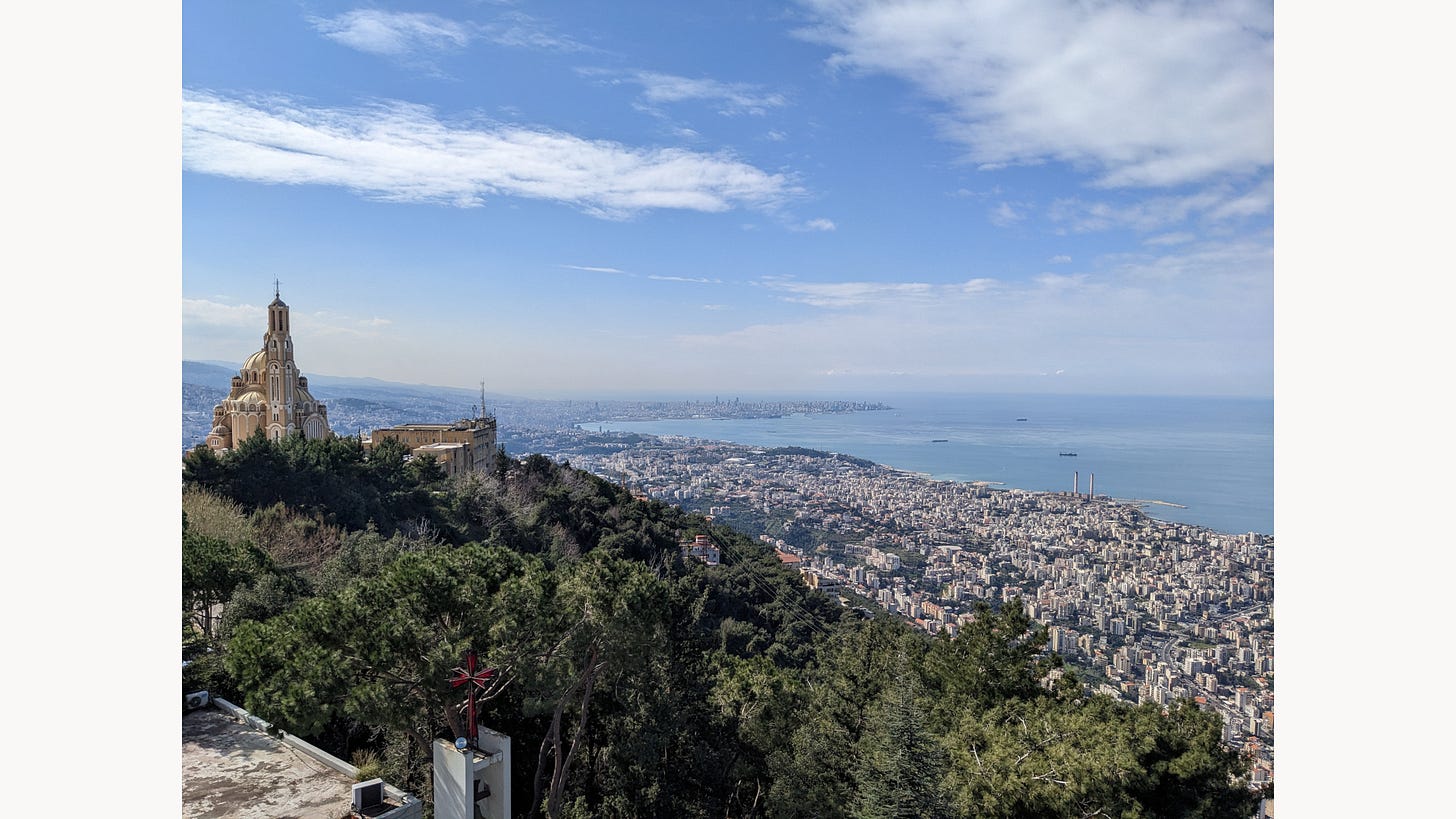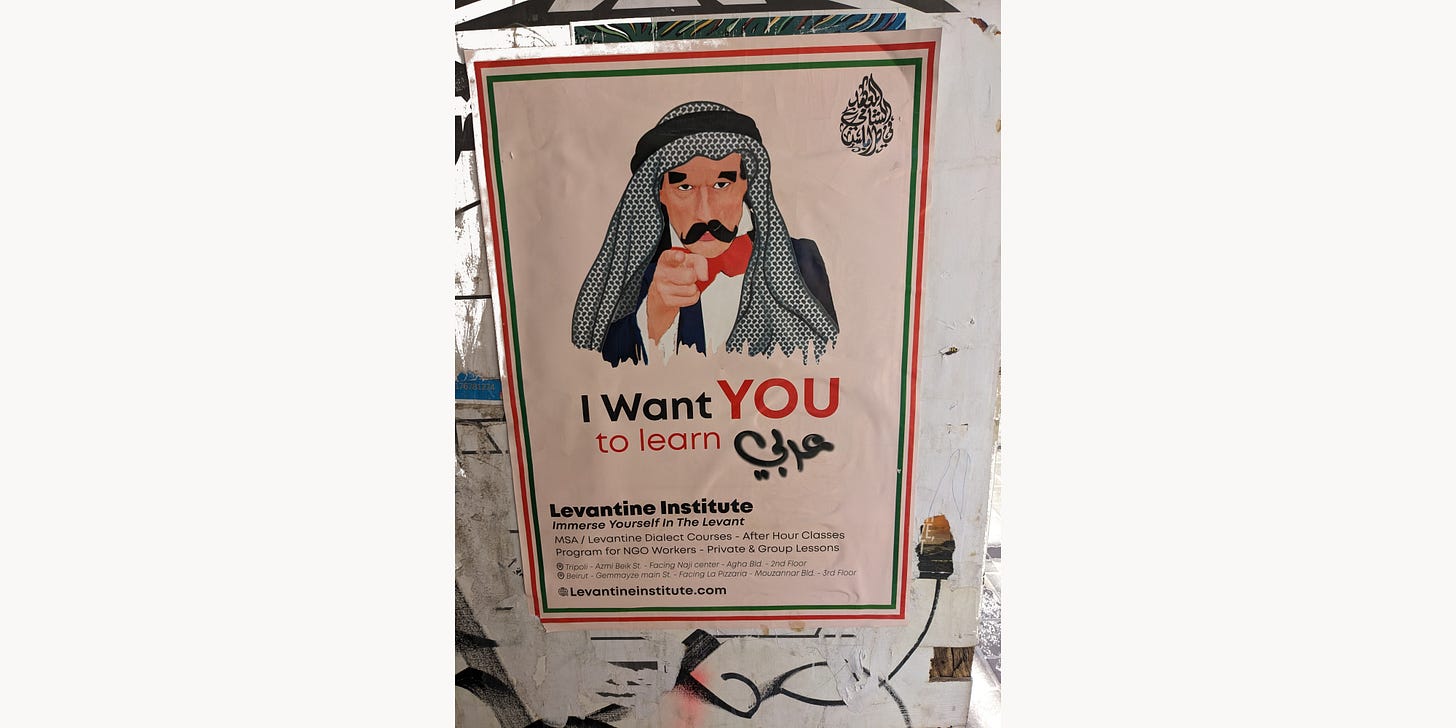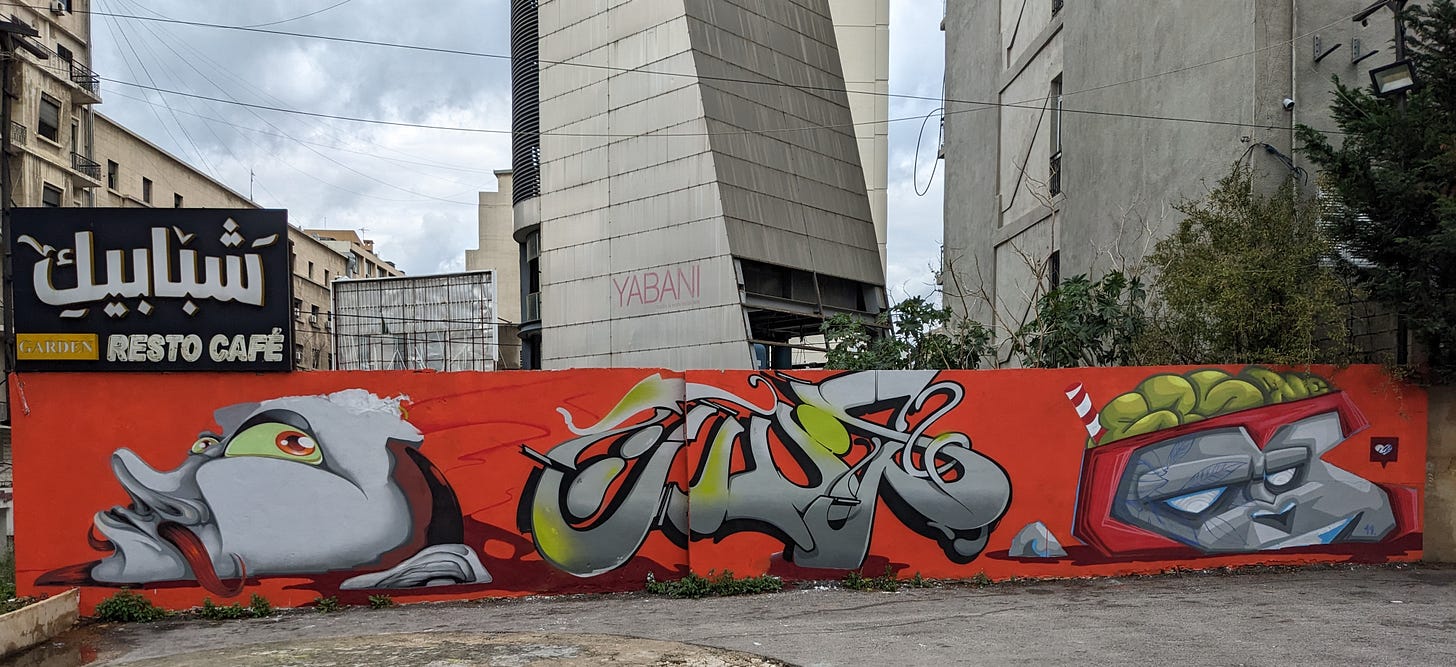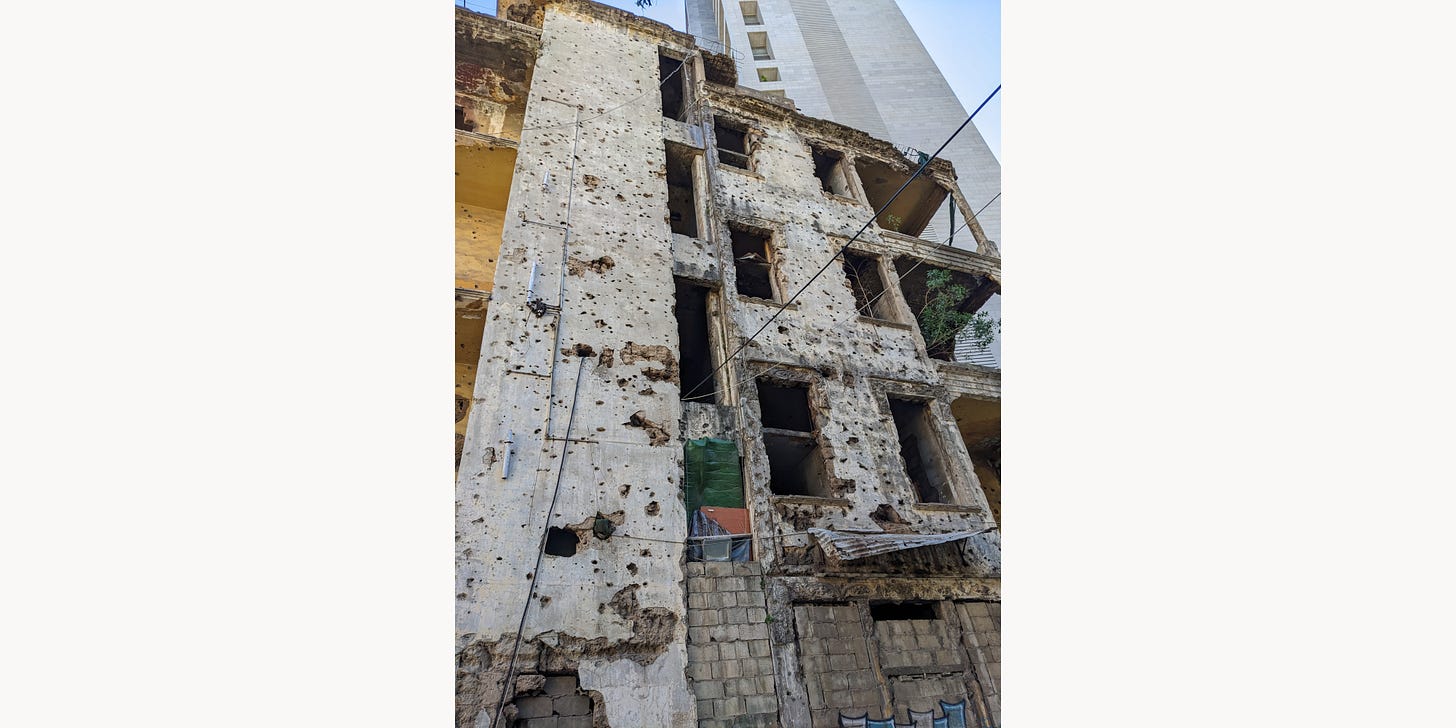A Month in Beirut
Decadence defeats Infrastructure
Divinely edgy is the term that comes to mind in trying to sum up the city of Beirut, where I’ve just spent one month. The through-line which binds together the various facades that it presents to the visitor seems to have been crafted by some film noir maestro. Nothing it does lacks edge.
From the wads of heavily-devalued 100,000 lira notes that you need to carry around to go out to the shops; to the tatty local buses that are a testament to the city’s utter refusal to prioritise infrastructure. Nothing it does lacks edge.
From the 0.5Mbps internet in Starbucks (if you’re lucky); to the turf wars between rival factions of “generator mafia,” supplying electric to a city where the grid is mostly down. Nothing it does lacks edge.
Beirut was the capital of glam back in the 60s and 70s, when Dubai was a desert stop-over for camel-drivers. High-living businessmen and film stars cuddled up to models in Les Caves du Roy, whilst the paparazzi papped. Nowadays the fortunes are strongly reversed. But, like the guy who shovelled up shit in the circus, many Beirutees are unwilling to leave their capital.

They seem not much interested in changing anything either. A 15-year civil war, Syrian control, prime ministers and politicians routinely assassinated, currency collapse, the Beirut Port blast, electric and water shortages. They blame the government and litter their conversations with the mournful Arabic conjunction yannee. But still have no intention of leaving, no matter what is hurled at them. Leave Beirut? Leave the greatest city ever? Leave show-business? Nope.
During my stay, there was a 7.8 scale earthquake a couple of hundred miles away, which created devastation on the Turkey-Syria border. In Beirut, my ninth story Airbnb shook like crazy but, like the rest of the city, remained upright. Aftershocks followed on a near-daily basis. But, on the street, the Beirutees seem relatively unperturbed. Yannee, another earthquake [shrugs shoulders]. What to do?
Beirutees love of decadence and glamour easily exceeds their desire to have a city with functioning infrastructure. And there is something in this that gives me hope for civilisation. Another people, facing what the average Beirutee faces on a daily basis, might be happy to kowtow to the spirit of the West and simply do what European cities do. Buses, trams, metro, proper internet, banking approved by the IMF. Until the city becomes merely a consumerist reflection of its former self.
But not Beirut.
It’s a concrete jungle. 2.5m people rammed into 8-10 storey blocks which shut out the skyline and give walking around a dense, compressing feel.
The city is littered with shelled and burned-out buildings from the civil war three decades previous.
But it’s Beirut. And it’s unbowed. And it’s special.
////////////////////
Information for Travellers (accurate as of Feb 2023)
Internet
Wired internet is liable to be grim. But you can buy a local SIM card by Touch Lebanon, or another supplier who’s name I’ve forgotten. I got a Touch card with 20GB (1 month) 4G and it cost about $25. People say it’s more expensive in the airport. There are official shops and also regular dealers. I went to this guy near Sassine Square and he was great.
Money
The Lebanese Pound (or Lira / LBP) has collapsed. Banks are mostly closed. As of Feb 2023, the exchange rate was 82,000 LBP to 1 USD. In 2019, it was 1,507! Everyone carries around wads of 100,000 Lira notes and you will need to do the same. The US dollar is accepted in some places but cards usually not. Check in advance.
You can bring USD in with you but it’s not vital to bring loads. You can take them out from some ATM machines in the city. Credit Libanais ATMs offer USD withdrawals for 3% commission, the best rate I found in my time there.
Change your USD for LBP at outlets of the yellow-fronted changers OMT, found throughout Lebanon.
Check the black-market exchange rate, as it’s called, here.
Popular supermarket chain, Spinney’s, will take USD denominated card payments, at a small commission.
Electricity
The grid seems to be only working for a few hours a day, so apartment blocks all have their own generators. These will often have down times - regular periods when they are switched off. Check with your accommodation in advance what time they have electricity. Avoid getting a room close to the generator (they’re usually in the basement) as it will no doubt make a hideous racket. See Rana Makhlouf’s amusing talk about generator issues, and other Beirut annoyanes, in this video.
Water
It may be pumped up the apartment you’re in, so liable to be off when the electric is off. I don’t recommend drinking tap water as it’s most likely to be from a tank.
Language
Like most Arab countries, many people will understand FusHa (Modern Standard Arabic) but use their own dialect. The regional language is Levantine Arabic but locals actually speak Lubnaani - a dialect of Levantine that is spoken only, not written down except in language books. Learn Lubnaani with Hiba Najem on YouTube here. Many people will speak reasonable French (Lebanon was a colony) and some English.
Culture
Lebanon is both Mediterranean and Phoenician, which means that if you’re from the West, you may well find it less liable to provoke culture shock than many places in West Asia (the Middle East). Many Lebanese even claim not to be Arabs at all, but Phoenicians.
Safety
I found Beirut surprisingly safe, especially given the financial crisis. I walked from Hamra back to Ashrafieh several times after midnight with no hassles.
Religion
Officially 50/50 Christian (Marionite) / Muslim (Sunni & Shia). Probably there are more Muslims now as many Christians have left with the financial crisis.
Politics
I was in a posh restaurant with Lebanese friends one night when one guy at our table pointed out a tall chap at a table nearby. “Oh look,” he said, “there’s XX, he’s that university professor who’s always on TV making speeches against Hezbullah. Just in case a heap of bearded gunmen storm in, be ready to jump under the table!” He was joking, kind of.
I found it fine to talk about politics in general but defo avoid religious politics.
Lebanese Phrases to Repel Child Beggars
For some reason, child beggars in Beirut are really persistent, even worse than those in Marrakesh. They will usually start by making mournful faces and pointing to their mouths and then progress to grabbing hold of you. Presumably, this tactic worked at some point in child beggar history and so has just become passed down. You can give them 10k LBP to go away, and they will run off shouting excitedly, all concerns about sustenance suddenly forgotten. But this will often only cause more child beggars to rock up, with more gestures and grabbing. Feel free to try using these phrases to repel them. Probably won’t work but worth a try…
Luh! - No!
Wa’eff - Stop that!
Fill min hawn - Go away!
I also need to mention that there are a lot of very poor people in Beirut, who rely on begging to survive, so these comments are just directed at the infant street hustlers.
Taxis
Uber or Bolt apps work for taxis but you need to select Cash as payment form and negotiate the price with the driver in advance. The apps don't keep up with the actual exchange rate. The current taxicab rate is 40k LBP per kilometre.
Service minibuses shuttle locals around and are cool to take. Driver may stop for a chat or a cig break. Shared taxis also popular.
Check Out
Urban Street Art, esp Yazan Halwani.
Food, from the street corner to the posh joints in Hamra, it is just superb.
Nightclubs and glamorous restaurants. Whatever new calamity shuts Beirut down, the first things to reopen will be the food joints and clubs.
Gemmayze art galleries and cocktail bars.
Walking tours from Alternative Beirut. The guides are invariable ultra political!
Taxi drivers that keep you up-to-date with the latest Arab world conspiracy theories
Beit Beirut. On the corner of Damascus and Independence and the site of the infamous “sniper’s corner” during the civil war. Now housing a fascinating display based around pre-civil war nightlife.
The Green Line. This is the street Damascus, from the big museum up to Martyrs Square, which served as a boundary between East and West Beirut (Christian and Muslim) during the civil war. It’s so called because an aerial view at the time revealed grass and weeds growing there, it not being safe to cross on account of snipers.
The movie West Beirut. A beautiful movie set at the start of the civil war. I paste a classic scene below.







"Beirutees love of decadence and glamour easily exceeds their desire to have a city with functioning infrastructure. And there is something in this that gives me hope for civilisation. Another people, facing what the average Beirutee faces on a daily basis, might be happy to kowtow to the spirit of the West and simply do what European cities do. Buses, trams, metro, proper internet, banking approved by the IMF. Until the city becomes merely a consumerist reflection of its former self."
Love this! Even if living there for locals might not so easy?!